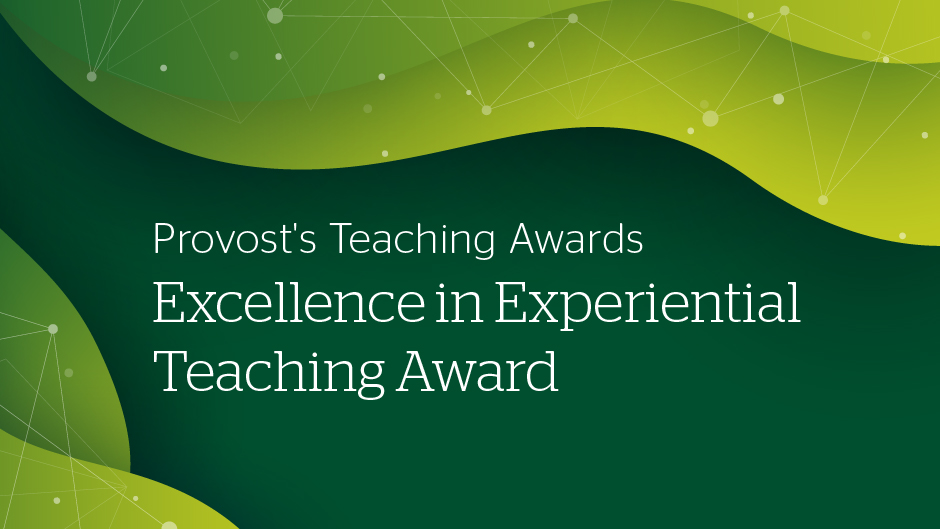More so than ever, the past academic year has proven that exceptional teaching extends far beyond the classroom. University of Miami faculty members worked tirelessly during the pandemic to pivot their approach to learning and teaching while expanding their support to students. To signal the importance of their dedication to providing exemplary education and the commitment to growth, the inaugural Provost’s Teaching Awards recognizes individuals who continue to remain at the forefront of the evolution of education.
In a three-part series, we're sharing pivotal career perspectives from 13 faculty members being recognized in the following categories: Luis Glaser Mentorship Award, Innovation in Teaching Award, and the Excellence in Experiential Teaching Award.
Excellence in Experiential Teaching Award—Provost’s Teaching Awards
In part three of the Provost’s Teaching Award series, awardees provided insight into why, and how, they have worked to introduce real-life, practical knowledge to coursework and the classroom.
The Excellence in Experiential Teaching Award recognizes faculty members who demonstrate an outstanding commitment to the student learning process, integrating excellent teaching with opportunities for experiential learning through curricular and co-curricular activities, and actively promoting and guiding learning outside of the classroom. Awardees also have excelled at developing students’ “practical intelligence.”
“Exposure to the practical application of knowledge is integral to ensuring that our students are prepared for successful and impactful careers,” said Jeffrey Duerk, executive vice president for Academic Affairs and provost. “As educators, we should recognize faculty members who continue to cement theory into knowlege via coursework and curricular opportunities that incorporate real-world experiences.”
Melissa Jane Barnes, lecturer, School of Communication
As managing director of the University’s first-ever student-run communication consultancy, Orange Umbrella, Barnes is recognized for her work in connecting with students through immersive experiential teaching, advising, mentoring, and service roles that ensures students are bridging the gap between the traditional classroom and the workplace and preparing for their professional life.
“Since Orange Umbrella opened its doors in 2017, the growth of students, clients, projects, and opportunities has been exponential,” shared Barnes. “Orange Umbrella successes are rooted in the belief that experiential learning empowers students to be independent and freethinking, guaranteeing real professionalism long before graduation and success. My personal passion for real-world application in the classroom is underscored and heightened every single day in Orange Umbrella. I am so thankful to be able to practice this emerging style of teaching in a way that positively affects students' lives for the better.”
Sonia Chao, research associate professor in the School of Architecture and director of the Center for Urban and Community Design
Chao writes and teaches in the area of sustainable architecture and urbanism, resilient design, and historic preservation in the subtropics. Throughout her courses, she provides expanded learning opportunities to her students by interconnecting formal and informal methods and often layering a variety of topics, including urban and building resilience with historic preservation, ecosystem services, and or with urban codes.
“I encourage students to search for truths, innovation, and knowledge precisely at the intersections of topics and viewpoints. This creates occasions for them to build practical expertise, skills, and know-how, attuned to the realities before them while strengthening their design-thinking and creative practices and community engagement approaches. These skills can yield sensible hyper-localized solutions to complex challenges in the short term. And in the long term, they can result in future climate leaders.”
Valerie Coleman-Page, assistant professor of performance, chamber music, and entrepreneurship at the Frost School of Music
Coleman-Page is an internationally acclaimed, Grammy-nominated flutist, composer, and entrepreneur. As part of her coursework, she invites students to interact and engage with world-class musicians, allowing them to view the entire process of professional efficiency—from the rehearsals to recording—in as few takes as possible.
“There is a critical point in time for musicians whose career livelihood either manifests or gives way to the pressures of finding a non-music-related job. My area of focus is centered on providing real-world opportunities to aspiring artists, to influence priority of values and the learning of entrepreneurship through small ensemble initiatives and collaborations. Chamber music is a highly valued field within today's music industry and is a key to a sustainable income. As an active flutist, composer, and career chamber musician, I know that chamber music can be a nimble and portable art, capable of forwarding innovation, supporting development and recruitment efforts, and serving as a resource for student well-being and equity. But yet, it is rarely regarded and supported within traditional academic settings. My work is all about building a world-class, real-world culture of chamber music and entrepreneurship at Frost, so that students can experience the path and make the connection toward its value.”
Rebecca Sharpless, professor of law and founding director of the Immigration Clinic at the School of Law
Through her work with the Immigration Clinic, Sharpless introduces hands-on opportunities in advocacy and litigation. Her teaching is infused with experiential learning, even outside the Immigration Clinic. She brings her experience as an immigration lawyer and litigator into the classroom through case examples and guest speakers who are involved in immigration policy work, organizing, and litigation.
"My work as director of the Immigration Clinic and coordinator of the area of focus in immigration, asylum, and citizenship law is rooted in my many years of experience as a practicing immigration lawyer. I believe it is critical for educators to bring the real world into the classroom and the other spaces where students learn and develop their values and professional identities. Our immigration program at the law school has arranged for lectures, conferences, and other experiences aimed at helping law students and others in our university community broaden their understanding of how immigration law and policy operates from the ground up."
Congratulations to awardees of the Excellence in Experiential Teaching Awards. Learn more about the Provost’s Teaching Awards, including the Luis Glaser Mentorship Award and the Innovation in Teaching Award.
The Provost’s Teaching Awards is featured in News@TheU as a three-part series.

